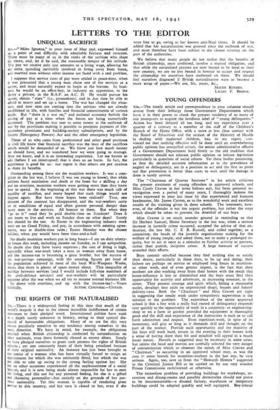THE RIGHTS OF THE NATURALISED
SIR,—There is a widespread feeling at this time that much of the world's tragedy is due to the almost incredible indifference of certain statesmen to their pledged word, International politics have sunk to a depth surely unknown in history, owing to their cynical dis- regard of honourable obligations. Many of us are for this very reason peculiarly sensitive to any tendency among ourselves in the same direction. We have in mind, for example, the obligations entailed when British citizenship is conferred by naturalisation on other nationals, even those formerly classed as enemy aliens. Surely we have pledged ourselves to grant such persons the rights of British citizens ; yet one constantly hears of their being penalised because of their original nationality. An instance has just been brought to our notice of a woman who has been virtually forced to resign an aPpointment for which she was eminently fitted, but which she was not able to take up owing to the strong feeling against her. She has on other occasions experienced all the unpleasantness of a social boycott, and it is now being made almost impossible for her to earn her living, and this not for any personal feeling, for she is a gifted and charming personality—but entirely on the grounds of her pre- ,nous nationality. Yet this woman is capable of rendering great service to this country, and her own is closed to her, even if she
were free to go, owing to her known anti-Nazi views. It should be added that her naturalisation was granted since the outbreak of war, and must therefore have been subject to the closest scrutiny on the part of the authorities.
We believe that many people do not realise that the benefits of British citizenship, once conferred, involve a mutual obligation, and that while the naturalised persons are now bound to he loyal to their new country, we are no less bound in honour to accept and respect the citizenship we ourselves have conferred on them. We should feel ourselves disgraced if British naturalisation were to lsecosste a mere scrap of paper.—We arc, Sir, yours, &c.,
MAUDE BOYDEN. LILIAN F. BRIDGE.


























 Previous page
Previous page